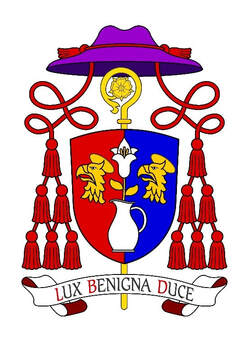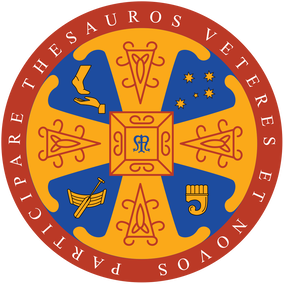 On the Value and Meaning of Fasting He fasted for forty days and forty nights, And afterwards he was hungry (Matt. 4:1,2) Pre-Lent 2022 To all clergy and members of The Personal Ordinariate of Our Lady of the Southern Cross Beloved in Christ, As we approach the 10th anniversary of the creation of our Ordinariate, established under the 2009 Apostolic Constitution, Anglicanorum coetibus, perhaps we might look back to 2009 and listen to the words of Pope Benedict XVI in his Lenten message for that year... (Read the full Lenten Message by clicking on the link to the PDF below)
0 Comments
Saint Theodore of Canterbury's Catholic Grammar School
Official Project Launch Speech - 20th Feb 2022 It has been clear to me and probably to you, that the make up of our community has changed since the Ordinariate was established 10 years ago. The faithful remnant who joined OLSC in 2012 are diminishing in numbers but the remnant has not diminished. Some have joined us on a regular basis while others are more irregular. The total number of worshippers on any given Sunday has remained roughly the same over the past 10 years. This presents us with two challenges. Those lifelong Catholics who have made the Ordinariate their spiritual home have done so for various reasons and while they may like the worship and sense of community, the English Spiritual Tradition that underpins this is less well understood. I am beginning to address this deficit this week with a pilot group discussion on what is this thing called English Spirituality. The second challenge is that the trickle of Anglicans into the Ordinariate has not turned in to a flash flood so how do we ensure that we grow in the future. When I was the Ordinary of OLSC, I and my colleagues wondered whether the Ordinariates would continue to be supervised by the Congregation for the Doctrine of the Faith or would we be moved to another Vatican Department that did not understand our history and our unique role in the quest for Church Unity. This was a concern of ours. Last week Pope Francis issued a document outlining a reform of the structure of the Congregation for the Doctrine of the Faith and in it he specifically mentioned that the Ordinariates would continue to receive oversight from the section of the Congregation that deals with teaching and communicating the faith as an essential element of evangelization and including Christian Unity. This has given us security. So we must respond by acknowledging that we are called to share the treasures of our tradition with others. How do we share the treasures of the English School of Spirituality as part of our passing on the faith? The four pillars on which the Catholic Church shaped its life in the past were the school, the convent, the church buildings and the priest. As in Highgate, these four buildings were often located alongside each other. We have a presbytery; we have two priests; we borrow a church building, but remember that Jesus borrowed everything to undertake his mission, and we haven’t got a school. In the ministry of the Church and its effort to teach the Faith to upcoming generations, schools have been a pillar. In times past, monks founded schools and now dioceses have their own education system. Yet religious schools are facing secularist challenges from pressure groups and government legislation and they are less effective in teaching the faith to the new generations than they were. This has to change, and we need not only to be part of that change, but at the spearhead of it. How do we try to share the faith now? We try to advertise our presence via Facebook and Websites, some churches use letterbox drops, others have missions or use music as the focus of their worship. These have some effect but, in our time, personal invitations such as, "Come and See", which we have had as our motto taken from the words of Saint Phillip, also bear results if the faithful are courageous enough to issue invitations. All these initiatives draw in some people to come and discover Jesus with us, and from that discovery there is always an eternal growing that begins. This is that process Pope Francis calls "accompaniment." These types of evangelisation need to be complemented by a more regular and thorough method of making disciples, which is found in the context of a formal Catholic education. In a formal education, the Holy Spirit speaks gradually over time, is intimately involved in a steady and ordered approach to learning the faith, in grasping ideas, in exercising the virtues, in both physical and mental development. Our spiritual ancestors knew that a formal education was a proven method for implanting the faith in others, especially the young, so that succeeding generations would be able to keep it and let it guide them through ever-changing and challenging times. With all this in mind, we have been seeking ways in which we might establish a Primary through to High school here in Perth, in order to foster and grow the next generations of Ordinariate Catholics of the English Patrimony. This not just as a good thing in itself, but is a necessity, given that our mission is to preach and teach the good news of Jesus. We need to share with young people the riches of our treasures. We need to see an orderly and successful pathway in which the next generation of the faithful are grown, and from which vocations to the priesthood and religious life maybe born. What we envisage is a type of school which is alternative to the mainstream Catholic education system here in the Archdiocese of Perth. Our project aims to build a whole new way of educating children and young adults not only in the Catholic Catechism and our English Patrimony, by presenting an alternative learning philosophy based in the genuine classical educational tradition. The school ethos would be centred on the traditional and classical methods of teaching children taken from renowned and proven educational thinkers and Anglican pioneers at the turn of the last century such as Charlotte Mason who said that "Children are born persons who have a natural love of knowledge and their education should be largely a self-education." In creating such a school, the intention is to assist parents in the education of their children, which is primarily their responsibility. We will aim to assist the students in growing a genuine love of God, with our education philosophy based on the great works of literature. The foundation of the student’s education will be based in the great works of the Western tradition which conveys knowledge to the child in literary form. Our students under the guidance of reason, will hopefully become adept at logic, debate and public speaking. They will learn of the strengths and weaknesses of the Western tradition, even some Latin and Greek, in addition to all the other requirement of the Western Australian Education Curriculum. A significant part of school life will be that of the Performing Arts. Dance, Music and Drama will feature throughout the course of schooling so that the important works of our spiritual and cultural tradition may be both performed, understood and embraced. Sport will also feature in the physical development of the students. As a Catholic school, the students will naturally study the Catholic Catechism. They will learn the Sacred Scriptures, both as the Word of God and as the fundamental basis of our culture. Emphasis will be given to Church history, exploring the lives of the Saints, to daily prayer, especially to our distinctive Mass and devotional life. We realise that such a venture is both arduous and costly, but I must emphasize that this school project is not a parish project. I hope that parishioners will support it, but it will be the responsibility of an Incorporated Association which has already been created. This new body will guide this project to completion. The members of the Incorporated Association have already spoken to other knowledgeable and educationally experienced people and have opened a bank account as well as complying with some government requirements. The proposed name of the school will be: - Saint Theodore of Canterbury's Catholic Grammar School, or Saint Theo's for short. The steering association is therefore called, Saint Theodore of Canterbury Incorporated. Why Saint Theodore of Canterbury? Saint Bede tells us in Book IV of The Ecclesiastical History of the English People that Saint Theodore, the seventh Archbishop of Canterbury, who was originally from Greek-speaking Tarsus, the home of Saint Paul, was "the first archbishop of Canterbury whom the entire Church of the English obeyed." A remarkable achievement given the fractious and divided nature of the state of the Church in England at the time. Bede tells us that Theodore, together with Abbot Hadrian of Canterbury, "being men of learning both in sacred and secular literature, attracted a large number of students, into whose minds they poured the waters of wholesome knowledge day by day. In addition to instructing them in the holy Scriptures, they also taught their pupils poetry, astronomy, and the calculation of the church calendar." Bede goes on to say that "in proof of this, some of their students still alive today are as proficient in Latin and Greek as in their native tongue." For us Saint Theodore also stands out in his connection to the life of Saint Chad. It was Theodore who regularised Chad's irregular consecration and eventually appointed him to be the Bishop to the Mercians (Lichfield). Saint Chad used to undertake his preaching missions on foot, whilst leading his horse. Theodore ordered him to actually ride the horse. Saint Bede tells us that this action of helping Chad to mount his horse speaks not only of the care and humility of Theodore but also of what education is all about. It is a hand helping us to mount the saddle of learning, to enable us to go forth on our mission alone. It is a symbol of the Church equipping and assisting us to serve the faith, to keep that faith and share it with others. The inspiration to found a new school for the Ordinariate community so that we can serve the faith, draws much from Theodore who managed to bring an explosion of Christian education into England at a time when a great amount of barbarism, ignorance and superstition prevailed among the common people, just as the forces of secularism, of atheism and internal Church divisions threaten to overwhelm us today. It is absolutely vital that as this project goes ahead, it must be driven by the leading of the Holy Spirit as a missionary act of the Body of Christ and not be another corporate style venture. It is a ministry, not an empire building exercise. Today I am asking on behalf of the Incorporated Association whose members are Nigel McBain, Charles Smith, Hayley Doan and myself, for your prayerful support. Without prayer, this will go nowhere. Pray that other capable and willing people might offer to become part of this Association or help in some other way. Pray for the members as they seek financial gifts to get this project further off the ground and above all, pray that interest in St Theodore’s might spread among parents and their children in our own and the wider community. The Association has created a website, sttheos.org which will be launched shortly and be the principal source of information for interested people as this challenging God driven vision emerges into reality. Carpe Diem – Let us seize the day! Msgr Harry Entwistle Feb 2022 |
ArchivesCategories |
||||||

 RSS Feed
RSS Feed